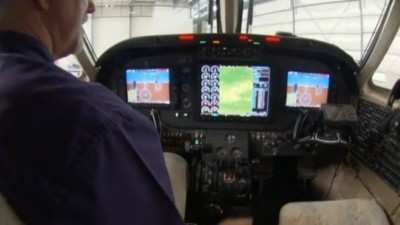Wed, Feb 02, 2011
Rising Demand For New Gadgets In Older Airplanes Could Buoy The
Sector
New research recently released by aviation analyst Frost &
Sullivan indicates that the economic downturn and the high prices
of fuel have combined to rein in the air transport aircraft market.
This has had a greater effect on the business aircraft and the
general aviation aircraft markets. While air transport aircraft
production declined by 4 percent in 2010, business and general
aviation aircraft production was cut by 40 percent in 2010. This
downturn comes after years of record aircraft production and has
had a significantly effect on avionics manufacturing. The retrofit
and aftermarket sales in previous years had resulted in
unprecedented profits for avionics manufacturers, but currently,
they are streamlining their operations and often relying on niche
markets to stay afloat. Manufacturers in both the air transport and
business aircraft markets can weather this turbulent phase if there
are only limited cancellations or deferrals of orders.

Although manufacturers will be hard hit by the dip in production
for the next five years, the growth in the individual parts of
integrated modular avionics (IMA), glass cockpits, and enhanced
awareness devices will go a long way in helping them to keep their
heads above water. For instance, both 787 and A350 use IMA, opening
up a new window of opportunity for component manufacturers. Glass
cockpits have also the expected configuration among new air
transport aircraft and is becoming a regular fitting in new
business and general aviation aircraft. Glass cockpits are now the
standard, even in piston aircraft, says the analyst of this
research. Enhanced vision systems, synthetic visions systems, and
heads-up displays are also making inroads into the market.

King Air Avionics Retrofit YouTube Frame
Capture
Avionics manufacturers have to rely on newer technologies for
growth opportunities until aircraft production starts to recover in
the general aviation market. They will also be heartened by the
overall rise in the age of fleets across the world. Older aircraft
could need significant hardware changes to comply with the 2020
U.S. implementation date of the Automatic Dependent
Surveillance-Broadcast (ADS-B) and the related Required Navigation
Performance programs. As the air transport market is likely to
experience lesser contraction and a quicker recovery, manufacturers
in that market space will be well positioned for growth after five
years, notes the analyst. Manufacturers that develop newer
technology systems are likely to find novel applications that
traditional suppliers cannot.
More News
Witness Reported The Airplane Was Flying Low And Was In A Left Bank When It Struck The Power Line Analysis: The pilot was on final approach to land when the airplane collided with >[...]
How To Get A Story On Aero-TV News/Feature Programming How do I submit a story idea or lead to Aero-TV? If you would like to submit a story idea or lead, please contact Jim Campbel>[...]
From 2012 (YouTube Edition): A Segment Of The Sport Aviation World That Truly Lives "Low And Slow" Pity the life of ANN's Chief videographer, Nathan Cremisino... shoot the most exc>[...]
Aero Linx: International Business Aviation Council (IBAC) IBAC promotes the growth of business aviation, benefiting all sectors of its industry and in all regions of the world. As >[...]
Execute Missed Approach Instructions issued to a pilot making an instrument approach which means continue inbound to the missed approach point and execute the missed approach proce>[...]
 NTSB Final Report: Cozy Cub
NTSB Final Report: Cozy Cub ANN FAQ: Contributing To Aero-TV
ANN FAQ: Contributing To Aero-TV Classic Aero-TV: Seated On The Edge Of Forever -- A PPC's Bird's Eye View
Classic Aero-TV: Seated On The Edge Of Forever -- A PPC's Bird's Eye View ANN's Daily Aero-Linx (04.29.25)
ANN's Daily Aero-Linx (04.29.25) ANN's Daily Aero-Term (04.29.25): Execute Missed Approach
ANN's Daily Aero-Term (04.29.25): Execute Missed Approach




